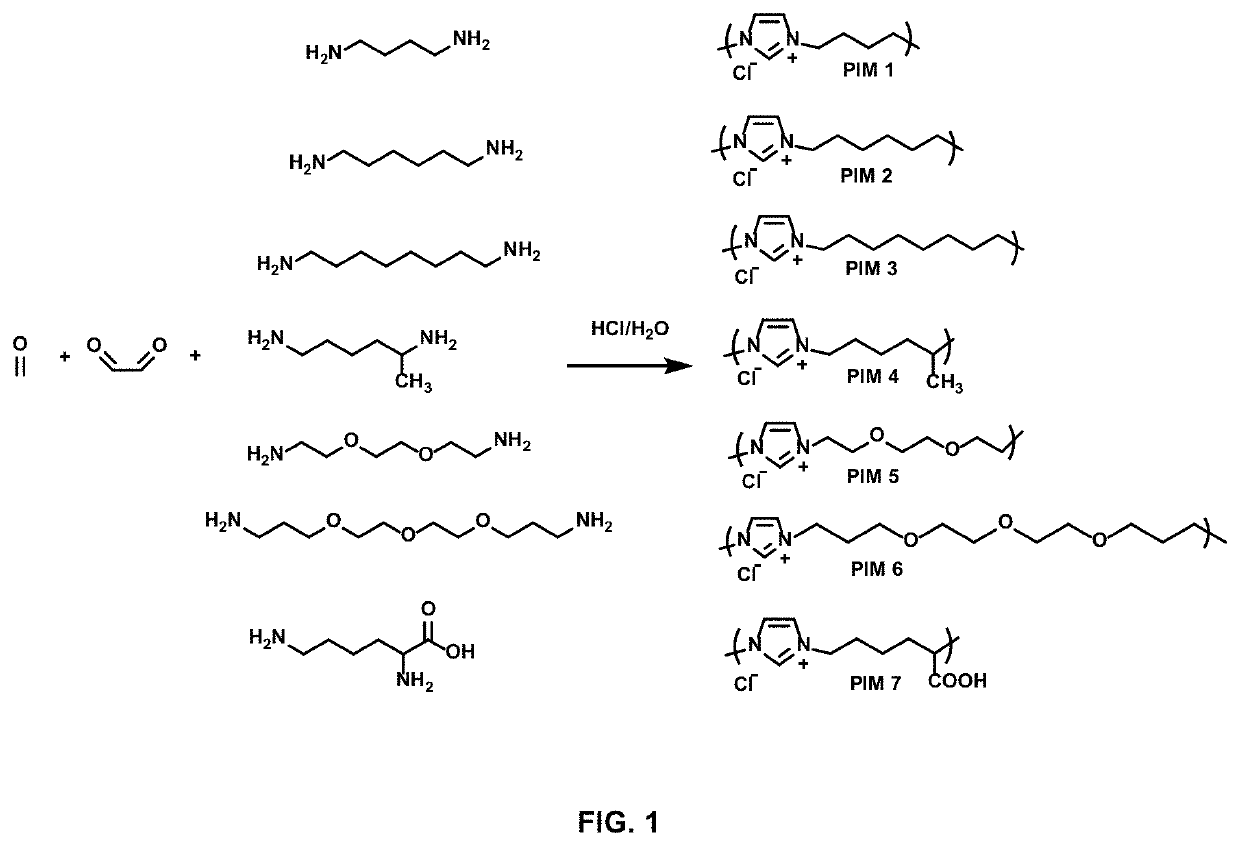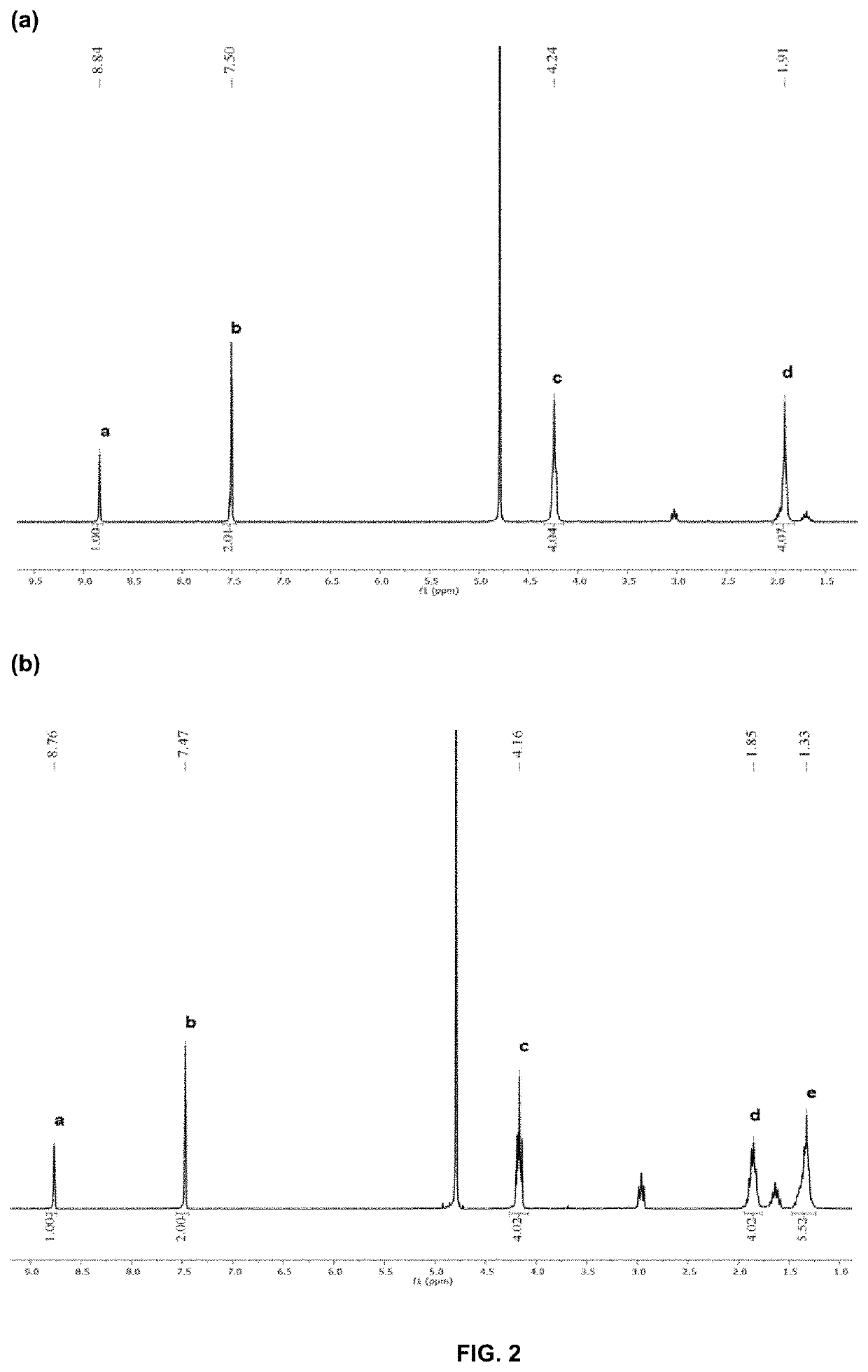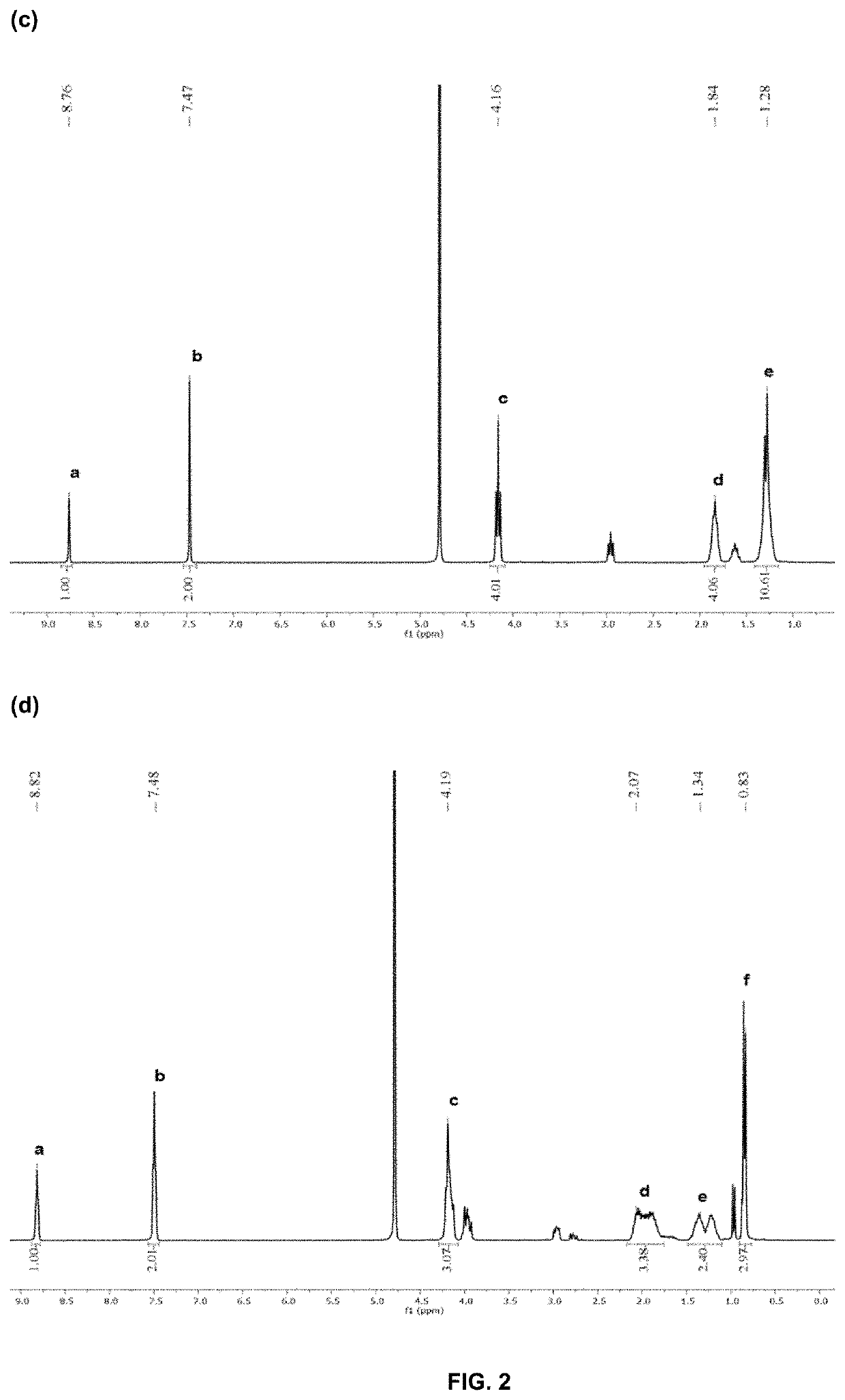Antimicrobial poly(alkylated imidazolium) salts
a technology of poly(alkylated imidazolium) and chloride salts, which is applied in the field of antibacterial poly(alkylated imidazolium) chloride salts, can solve the problems of negative side effects, high cost of production, and limited current use of antibacterial agents
- Summary
- Abstract
- Description
- Claims
- Application Information
AI Technical Summary
Benefits of technology
Problems solved by technology
Method used
Image
Examples
example 1
of PIM 1-7 as Chloride Salts
General Procedure for Synthesis of Imidazolium-Based Polymers
[0277]The following basic procedure was employed to prepare PIM 1-7. In a 100 mL round-bottom flask, aqueous solution of concentrated hydrochloric acid (37 wt %, 10.0 g, 100 mmol) was added dropwise to an aqueous solution of diamine (50 mmol in 10 mL of water) at 0° C. After 30 min, a mixture of formaldehyde (37 wt % in water, 2.31 g, 50 mmol) and glyoxal (40 wt % in water, 7.25 g, 50 mmol) was added dropwise to the above solution. Gradually, the color of solution changed from colorless to yellow. The reaction mixture was stirred for an additional 1 h at 80° C. Majority of the solvent and unreacted monomers was removed to give a yellow viscous oily liquid, which was diluted with water and dialysed with a dialysis bag (1 kDa cut-off) for 2 days.
PIM 1 Chloride
[0278]Treatment of concentrated hydrochloric acid (37 wt %, 10.0 g, 100 mmol) and diaminobutane (4.41 g, 50 mmol) with formaldehyde (37 wt %...
example 2
Sizes and Zeta Potential of PIM 1-7 Chlorides in Phosphate Buffered Saline (PBS)
[0287]The particle sizes and zeta potential values of the polymers in PBS were measured (Table 2). The hydrodynamic sizes for all PIMs were less than or around 2 nm in PBS buffer indicating that the polymers did not aggregate in PBS but remained as individual polymer chains. All polymers showed positive charges in PBS with a zeta potential ranging from +1 mV to +15 mV. With the increase of alkyl chain length from PIM 1 to PIM 3, a slight decrease in the zeta potential was observed and this was probably due to the decrease in charge density on the cationic imidazoliums with longer alkyl chain.
[0288]
TABLE 2Size and zeta potential measurements of PIM 1-7 in PBS buffer.Number MeanZ-averageMean CountZeta PotentialSample(d / nm)(d / nm)PDIRate (kcps)(mV)PIM 12.0 ± 0.1360.4 ± 56.5 0.39 ± 0.06320.6 ± 28.914.5 ± 0.7 PIM 22.3 ± 0.1724.8 ± 125.90.58 ± 0.17304.5 ± 22.510.3 ± 0.3 PIM 32.2 ± 0.8 1378 ± 330.90.86 ± 0.10175...
example 3
dal Activities of PIM 1-7 Chlorides on Laboratory Bacteria Strains
[0289]The effect of the hydrophilic / hydrophobic balance of PIM 1-7 chlorides on bactericidal activity was investigated as shown in Table 3, using the MIC protocol described above. The seven polymers were tested on a series of ESKAPE bacteria (Enterococcus faecium, Staphylococcus aureus, Klebsiella pneumoniae, Acinetobacter baumannii, Pseudomonas aeruginosa, and Enterobacter species), as well as some other bacteria.
[0290]PIM 1 chloride demonstrated antibiotic-like low minimum inhibitory concentrations (MICs) (E. faecalis (OG1RF) and S. aureus (ATCC 29213) as well as Gram-negative K. pneumoniae (ATCC 13883 and KPNS-1), A. baumannii (ATCC 19606), P. aeruginosa (PAO1, and pan-sensitive PAES-1), and E. coli (EC 8739)), as well as Bacillus subtilis (ATCC 6633).
[0291]PIM 2 chloride, which has a longer alkyl chain than PIM 1, gave slightly improved bactericidal activity than PIM 1. This is consistent with previously reported ...
PUM
| Property | Measurement | Unit |
|---|---|---|
| molecular weight | aaaaa | aaaaa |
| molecular weight | aaaaa | aaaaa |
| molecular weight | aaaaa | aaaaa |
Abstract
Description
Claims
Application Information
 Login to View More
Login to View More - R&D
- Intellectual Property
- Life Sciences
- Materials
- Tech Scout
- Unparalleled Data Quality
- Higher Quality Content
- 60% Fewer Hallucinations
Browse by: Latest US Patents, China's latest patents, Technical Efficacy Thesaurus, Application Domain, Technology Topic, Popular Technical Reports.
© 2025 PatSnap. All rights reserved.Legal|Privacy policy|Modern Slavery Act Transparency Statement|Sitemap|About US| Contact US: help@patsnap.com



